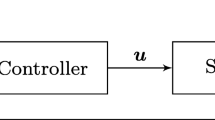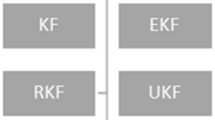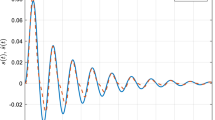Abstract
A recursive algorithm for the two-stage empirical frequency-domain optimal parameter (EFOP) estimation method was proposed. The EFOP method was a novel system identification method for Black-box models that combines time-domain estimation and frequency-domain estimation. It has improved anti-disturbance performance, and could precisely identify models with fewer sample numbers. The two-stage EFOP method based on the boot-strap technique was generally suitable for Black-box models, but it was an iterative method and takes too much computation work so that it did not work well online. A recursive algorithm was proposed for disturbed stochastic systems. Some simulation examples are included to demonstrate the validity of the new method.
Similar content being viewed by others
References
Ljung L. System Identification: Theory for the User. 2nd ed. New Jersey: Prentice-Hall, 1999. 197–233
McKelvey T, Akcay H, Ljung L. Subspace-based identification of infinite dimensional multivariable systems from frequency-response data. Automatica, 1996, 32(6): 885–902
Pintelon R, Schoukens J, Vandersteen G. Frequency domain system identification using arbitrary signals. IEEE Trans Auto Contr, 1997, 42(12): 1717–1720
Ninness B, Gomez J C. Frequency domain analysis of tracking and noise performance of adaptive algorithms. IEEE Trans Sig Proc, 1998, 46(5): 1314–1332
Lo K M, Kwon W H. A new identification approach for FIR models. IEEE Trans Circr Syst II-Anal Dig Sig Proc, 2002, 49(6): 439–446
Lo K M, Kwon W H. New identification approaches for disturbed models. Automatica, 2003, 39(9): 1627–1634
Lo K M, Kimura H, Kwon W H, et al. Empirical frequency-domain optimal parameter estimate for Black-box processes. IEEE Trans Circ Syst I — Reg Papers, 2006, 53(2): 419–430
Lo K M, Kimura H. Recursive estimation methods for discrete systems. IEEE Trans Auto Contr, 2003, 48(11): 2019–2024
Author information
Authors and Affiliations
Corresponding author
Additional information
Supported by the National Key Basic Research and Development Project, (Grant No. 2004CB719400), the National Natural Science Foundation of China (Grant Nos. 60474026 and 60672110)
Rights and permissions
About this article
Cite this article
Luo, G., Huang, J. Recursive algorithm for the two-stage EFOP estimation method. Sci. China Ser. F-Inf. Sci. 51, 145–157 (2008). https://doi.org/10.1007/s11432-008-0007-3
Received:
Accepted:
Issue Date:
DOI: https://doi.org/10.1007/s11432-008-0007-3




